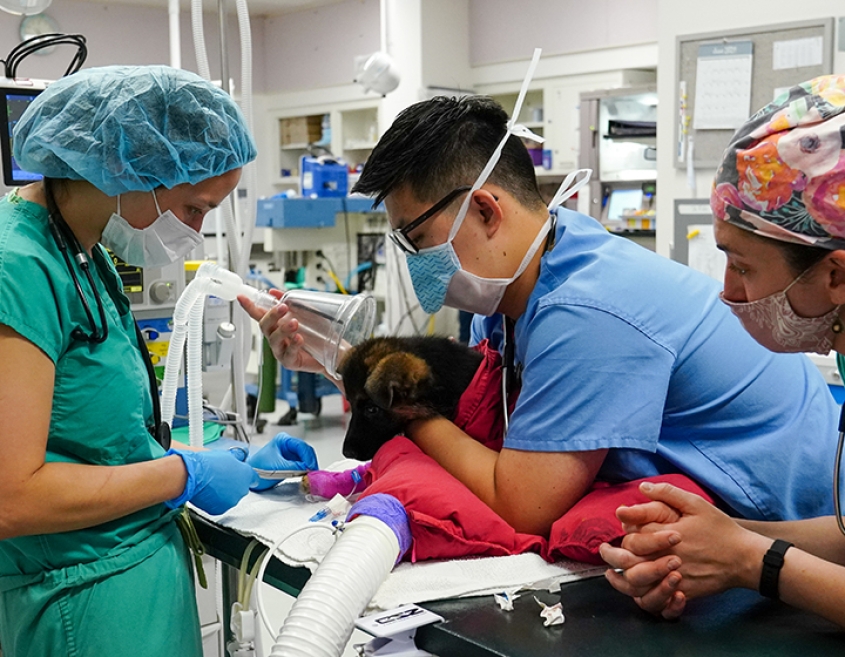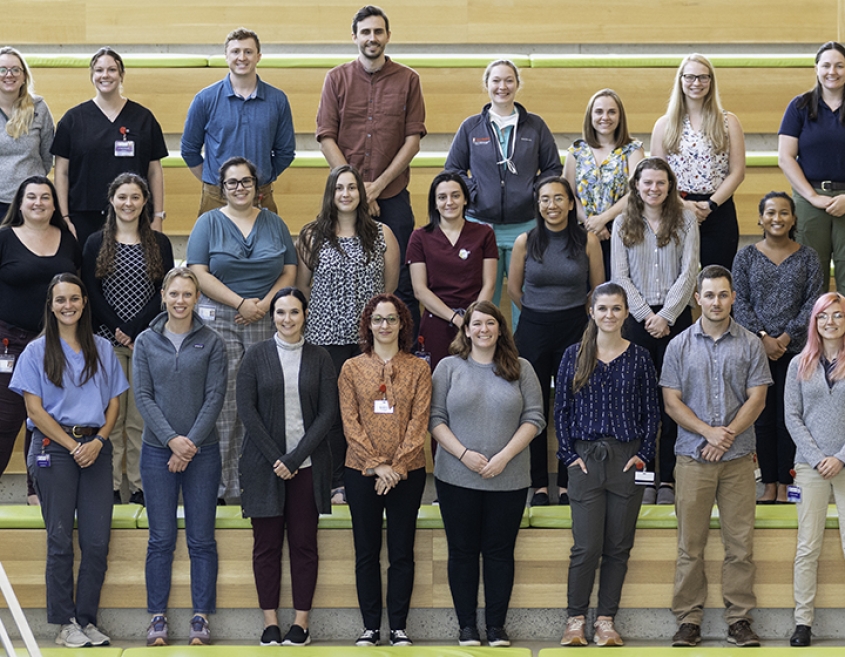The small animal rotating internship provides a strong foundation for participants to pursue more advanced training or private practice. We've successfully placed interns into residency programs spanning cardiology, dermatology, emergency and critical care, internal medicine, neurology, oncology, dentistry and oral surgery, diagnostic imaging, and surgery.
About the internship
An intern is an integral member of the Cornell University Hospital for Animals staff, providing the best available care to patients and assisting in the instruction of students.
You will be part of a team with fourth-year veterinary students, residents and faculty during core rotations through day, swing and overnight shifts in emergency, soft tissue and orthopedic surgery and internal medicine, as well as mandatory scheduled rotations through cardiology, neurology, anesthesia and diagnostic imaging.
Interns carry primary case responsibility when on the emergency service, with backup from an on-site resident 24 hours a day, with faculty available by phone if needed. When on the surgery or medicine rotation, you will have opportunities to have some primary case responsibility under the supervision of residents and faculty. As with much of your senior year in clinics, you will get out of the internship what you put into it, so a proactive approach to your rotations yields the greatest depth of training.
Approximately eight weeks are available for elective rotations through other specialty services, such as exotics, oncology, neurology, cardiology, clinical pathology, radiology and dentistry. Five of these weeks will occur prior to VIRMP match deadlines to allow ample time for letters of recommendation to be solicited.
Interns participate in dedicated weekly intern teaching rounds given by faculty and residents, as well as daily case rounds with their respective services. Additionally, they are encouraged to participate and attend other specialty service rounds and journal club. Each intern will also deliver one formal 15-minute presentation to students, interns, residents and faculty members in the spring.
Learn about what life is like at the College of Veterinary Medicine
Frequently asked questions
How much primary case responsibility will I have as an intern?
Interns have primary case responsibility on day, weekend and overnight emergency shifts, which accounts for about 35% of the internship. During this time, backup from residents and emergency critical care (ECC) faculty is always provided. An ECC resident is present in the hospital 24/7 to provide immediate assistance if needed. During other rotations, primary case responsibility is available under supervision from residents and faculty on a case-by-case basis.
How much surgical experience will I get during my internship?
Interns are part of a surgical team consisting of faculty, residents and fourth-year veterinary students. Interns rotate through both soft tissue and orthopedic surgery and are encouraged to assist residents and faculty in surgical procedures. Because we have an active residency training program and serve as a tertiary referral hospital, interns do not act as primary surgeons for major procedures. Interns will gain experience with wound management, laceration closures and a variety of emergency procedures. Actively approaching cases and surgical time yields the best results.
How much didactic learning is offered to interns?
Weekly hour-long topic rounds are presented by faculty and residents specifically for interns. Additionally, interns are expected to participate in daily case rounds with their respective services. Specialty service rounds, journal club and board review sessions are offered throughout the year and interns are encouraged to attend when available. Student groups have frequent evening lectures in a variety of subjects and the New York State Veterinary Conference occurs at Cornell every October (free to house staff). Interns can visit these lectures as time allows with your schedule.
If I work overnights, is the hospital safe?
Yes, Cornell is staffed by a 24-hour security and police staff. Doors to the hospital are locked overnight and can only be opened from within. Parking is available just outside the hospital (which is also convenient during the winter months).
Can I bring my pets to work?
Staff and student pets are not allowed in the hospital unless being treated or there for teaching purposes. However, many veterinary students still in the didactic phase of their training are available and willing to serve as dog walkers during their lunch.
How many weeks do interns in your programs typically spend in each of the specialties and subspecialties?
The current schedule comprises:
- 10 weeks on surgery (5 soft tissue, 5 orthopedics)
- 8 weeks on Internal Medicine
- 5 weeks on ACVIM-affiliated specialties (2 weeks in cardiology, 2 weeks in neurology, 1 week in oncology)
- 17 weeks on emergency
- 8 weeks elective
- 1 week on diagnostic imaging
- 2 weeks on anesthesia
- Two weeks of vacation are provided and can be taken during elective time.
Do interns often complete research projects?
The internship at Cornell is an intensive year-long clinical experience intended to prepare you for either specialization or private practice. Due to the clinical demands, research projects are not a requirement. If you have an interest in research, it is possible to find faculty mentors willing to assist with projects.
What equipment is available at Cornell?
Point of care monitoring in the ER and ICU includes a blood gas, electrolyte, and co-oximetry analyzer (Siemen’s Rapidpoint), electrolyte and troponin analyzer (iStat), coagulation testing (PT and aPTT), viscoelastic testing (TEG and VCM), VetTest chemistry analyzer, beta-hydroxybutyrate and lactate meters, and microscope.
Imaging capabilities include digital radiography, CT (16 slice), MRI (1.5 tesla), and fluoroscopy. Ultrasound units are available in the ER and ICU for point-of-care use. Two mechanical ventilators (Maquet Servo-U and Philips V200) are available. Multiple options for cardiac output monitoring (thermodilution, LiDCO and NICO) are also available.
Cornell is supported by a robust diagnostic laboratory including a world-renowned coagulation laboratory. A state-of-the-art interventional radiology suite is currently in development, and we have recently introduced extracorporeal therapies (see below).
Does Cornell offer hemodialysis or CCRT?
A new extracorporeal therapies unit has been treating patients as of fall of 2023. Using the Baxter Prismax platform, extracorporeal therapies including kidney replacement therapy (combination convective and diffusive therapies), hemoperfusion, and therapeutic plasma exchange are being offered. The extracorporeal therapies service at Cornell is under the umbrella of the ECC team with our residents playing a significant role. Future expansion of the service will include addition of a traditional discontinuous kidney replacement platform and eventually centrifugal apheresis equipment to further expand the therapies we can offer.
What types of cases are seen through the ER?
The caseload at Cornell has increased significantly over the last three years, with over 10,000 small animal patients per year now being evaluated by clinicians on the emergency service. Both ECC residents and faculty provide oversight for cases primarily managed by the interns.
We have a diverse caseload, including primary walk-in emergencies (lacerations, trauma victims, obstructed cats, etc.) and complicated tertiary referrals (hyperosmolar diabetics, necrotizing pancreatitis, etc.), with many clients travelling 1-3 hours to reach us. Patients admitted by the emergency service are transferred to other services, including the critical care service, every day (including weekends and holidays).
Living in Ithaca
Beyond the doors of the hospital, Ithaca offers an abundance of restaurants, galleries, theaters, outdoor and cultural activities. Located on the southern tip of Cayuga Lake, and at the start of the Finger Lakes wine trail, its four state parks and over a hundred waterfalls and gorges within a 10-mile radius of Ithaca’s downtown pay homage to the ubiquitous “Ithaca is Gorges” bumper stickers.
Warm summers allow for outdoor concerts, hiking, mountain biking and boating. Winters are long but snow is usually plentiful and brings out the best in snow enthusiasts, with cross-country skiing, snowshoeing and the elite Cornell men's and women's hockey teams. Festivals in all four seasons highlight the community and beauty Ithaca has to offer.
Contact us
Have questions? Please reach out to us at cuha-virmp@cornell.edu.






